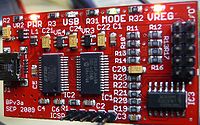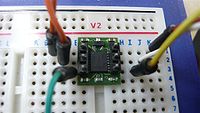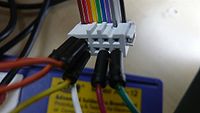Project:HM55B
About the module
$20-25 compass module for embedded systems, this comes in a convenient DIL package.
The SMD will probably be cheaper, though I have not managed to source one yet.
Italics in this article are straight quotes from datasheet.
Bus Pirate pinout
From http://dangerousprototypes.com/docs/Bus_Pirate_101_tutorial
Pin name Description (Bus Pirate is the master) MOSI Master data out, slave in (SPI, JTAG), Serial data (1-Wire, I2C, KB), TX* (UART) CLK Clock signal (I2C, SPI, JTAG, KB) MISO Master data in, slave out (SPI, JTAG) RX (UART) CS* Chip select (SPI), TMS (JTAG) AUX Auxiliary IO, frequency probe, pulse-width modulator ADC Voltage measurement probe (max 6volts) Vpu Voltage input for on-board pull-up resistors (0-5volts). +3.3v +3.3volt switchable power supply +5.0v +5volt switchable power supply GND Ground, connect to ground of test circuit
In the photo the pins on right connector, from top left:
GND +3.3V +5V ADC Vpu AUX CLK MOSI CS MISO
Connecting
Wiring
HM55B Bus Pirate Din(1) MOSI Dout(2) MISO VSS(3) GND CLK(4) CLK /EN(5) CS Vdd(6) +5V
Starting a terminal session
Plug in the bus pirate then (assuming it's the only USB device plugged in a debian based os):
$ screen /dev/ttyUSB0 115200
Testing with the BusPirate
Once in the terminal session, apply these settings:
- M (mode)
- 8 (3-wire raw)
- 4 (400KHz)
- 2 (3.3V high)
- W (turn on 5V output)
NB The numbering might be different depending on firmware version.
Checkpoint
There should now be +5v measured between HM55B pins 3 and 6.
To cover this use case:
? help
/\ Clock H/L ~ CLK pin
-/_ Data H/L ~ MOSI pin
! Read bit ~ MISO pin
[] CS L/H ~ CS pin
&/% Delay us/ms
: Repeat
Reset HM55B
Reading in plain english, "Set clock pin to low, set CS pin to low, shift out %0000 on the rising edge of the clock then set CS pin to high".
Noting that CS maps to active low /EN pin.
\[/_\/_\/_\/_\]
Bus Pirate output - noting output formatting is configurable(TODO check options):
CLOCK, 0 CS ENABLED CLOCK, 1 DATA OUTPUT, 0 CLOCK, 0 CLOCK, 1 DATA OUTPUT, 0 CLOCK, 0 CLOCK, 1 DATA OUTPUT, 0 CLOCK, 0 CLOCK, 1 DATA OUTPUT, 0 CLOCK, 0 CS DISABLED
Start measurement
Start a measurement by taking /EN low again, then shift-out %1000. Leave /EN low until checking the measurement status.
[/-\/_\/_\/_\
Bus Pirate output:
CLOCK, 0 CS ENABLED CLOCK, 1 DATA OUTPUT, 1 CLOCK, 0 CLOCK, 1 DATA OUTPUT, 0 CLOCK, 0 CLOCK, 1 DATA OUTPUT, 0 CLOCK, 0 CLOCK, 1 DATA OUTPUT, 0 CLOCK, 0
Checking measurement status
To check the measurement status, start by sending a positive pulse to /EN. Then, shift-out %1100.
][/-\/-\/_\/_\
Bus Pirate output:
CS DISABLED CS ENABLED CLOCK, 1 DATA OUTPUT, 1 CLOCK, 0 CLOCK, 1 DATA OUTPUT, 1 CLOCK, 0 CLOCK, 1 DATA OUTPUT, 0 CLOCK, 0 CLOCK, 1 DATA OUTPUT, 0 CLOCK, 0
Polling
Shift in the status flag, upon receipt of %1100, discontinue polling.
!!!!
Bus Pirate output:
READ BIT: 1 READ BIT: 1 READ BIT: 0 READ BIT: 0
Take sample
Leave /EN low, and move on to shifting-in the x and y-axis values.
Shifting-in the x and y-axis values is a simple matter of shifting-in 11 bits for the x-axis measurement followed by 11 more bits for the y-axis measurement. After completing the y-axis shift-in, set the /EN pin high again.
!!!!!!!!!!!!!!!!!!!!!!]
Bus Pirate output:
READ BIT: 1 READ BIT: 1 READ BIT: 1 READ BIT: 1 READ BIT: 1 READ BIT: 1 READ BIT: 0 READ BIT: 1 READ BIT: 1 READ BIT: 0 READ BIT: 1 READ BIT: 1 READ BIT: 1 READ BIT: 1 READ BIT: 1 READ BIT: 1 READ BIT: 1 READ BIT: 0 READ BIT: 1 READ BIT: 1 READ BIT: 1 READ BIT: 1 CS DISABLED
Converting the reading to an angle
The x-axis reports (field strength) × cos(θ), and the y-axis reports the (field strength) × sin(θ). To resolve θ into a clockwise angle from north, use arctan(-y/x)
angle θ = arctan(-y/x)
In the example:
x = 0b11111101101 y = 0b11111101111
The Hitachi HM55B chip on the Compass Module reports its x and y axis measurements in terms of microteslas (μT) in 11-bit signed values.
Since both most significant bits equal one, x and y are negative and we take the two's complement:
11111101101 00000010010 00000010011
x = -19
11111101111 00000010000 00000010001
y = -17
angle θ = arctan(17/-19)
angle θ = -41.82
The range is plus and minus 180. Positive values sweeping east, negative sweeping west. The reading above indicates north west.
Sample readings:
0,-6
-1,-11
-1,-19
Combining all commands
A delay is required between starting the measurement and shifting in the status flag:
\[/_\/_\/_\/_\][/-\/_\/_\/_\][/-\/-\/_\/_\&&&&&&!!!!!!!!!!!!!!!!!!!!!!!!!!]
Note that &&&&&& works but &:6 does not, even though the nominal value in both cases is the same, presumably because BusPirate parser adds a huge delay. This means that we don't know how fast this module can be clocked, because each ! will be > 50ms apart.
The BusPirate wiki suggests this will work (since we've determined that it still provides the 22 sample bits even if the reading is incomplete):
\[0b0000 &] [0b1000 && ]&[& 0b1100 r:4]
Exiting
ctrl-a \y
Improvements
- Script all of the commands above.
- Script to include a conversion algorithm returning an actual reading in degrees.
- Add a compass calibration procedure (vital), though the proof of concept works so might not be practical to do this at the bit level.


